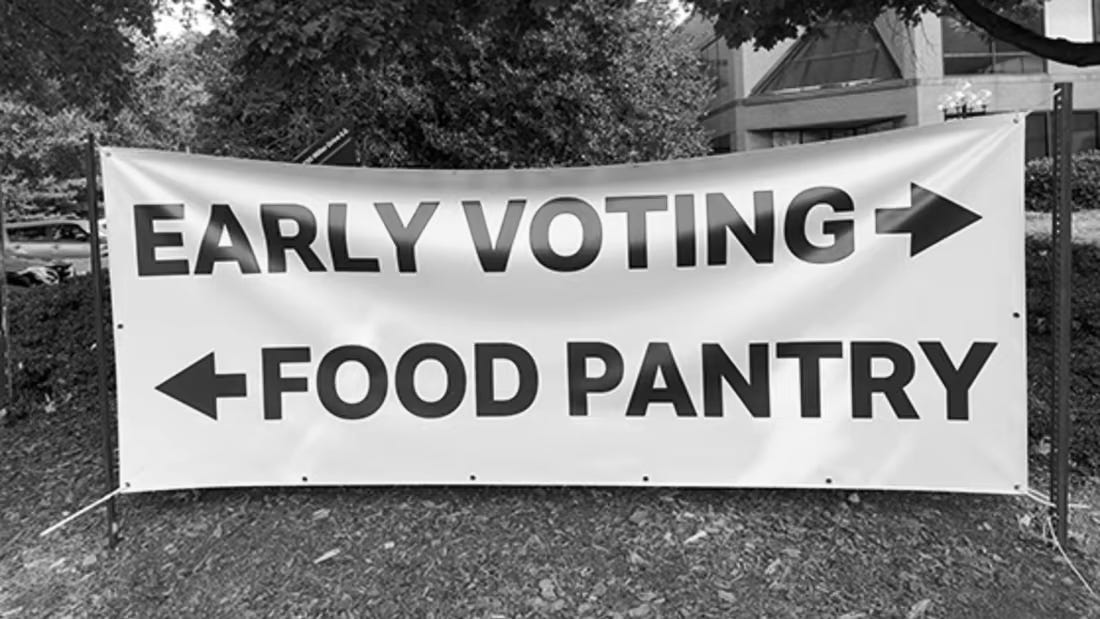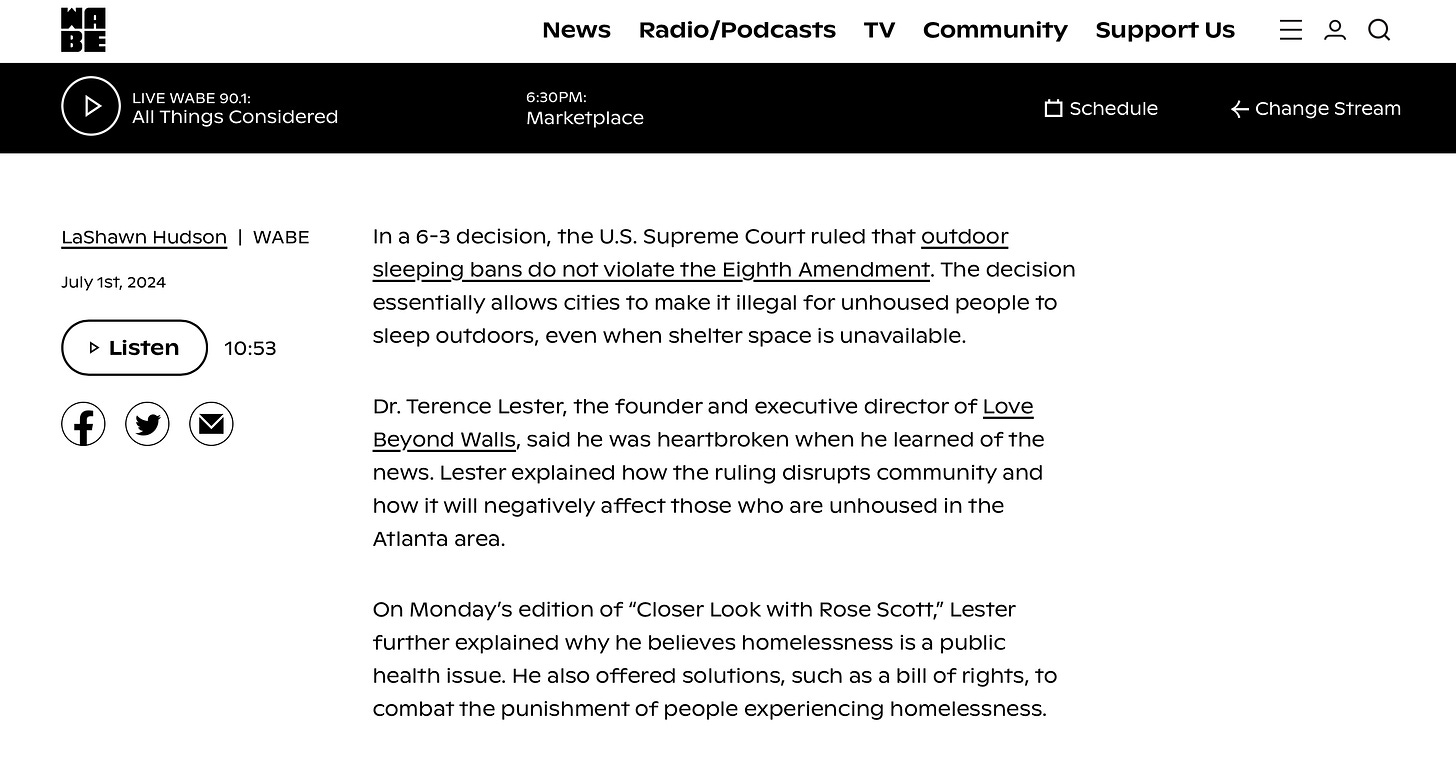Homelessness Makes It Harder to Vote in Georgia
Can the Unhoused Participate in the Political Process?
As election season continues to draw closer, commentators, social media influencers, and everyone in between are making sure to encourage people to vote because a lot is at stake. However, one group of people who are often forgotten when it comes to talking about politics, voter registration, and access to the political process is the unhoused community.
Most times, people use horrible terms like “political unhoused” to describe where they stand politically without even considering how offensive this could be to someone who is unhoused and facing several barriers that make it harder to vote.
What if they do not want to be “politically homeless” and are just forced to be because they are experiencing homelessness?
To make matters worse, a new bill has become state law in GA that makes this even more of a reality for the unhoused community. Coming right off the Supreme Court decision to legalize the punishment of the unhoused community, this law follows that up by making it harder for this community to participate in democracy.

Today, in the State of Georgia, a law goes into effect that significantly impacts those who are unhoused and their access to voting. Senate Bill 189 became state law on July 1st, directly affecting a person's right to participate in the voting process.
The law states:
"The mailing address for election purposes of any person of this state who is homeless and without a permanent address shall be the registrar's office of the county in which such person resides."
It also stipulates that:
"(C) Proof of ownership or rental of a post office box or private mailbox service address within a particular jurisdiction shall not constitute sufficient grounds to establish a person's residency within that particular jurisdiction."1
For people using a nontraditional address (like a shelter or a public place), this could result in challenges to their eligibility to vote, potentially excluding them unless they can provide additional proof of residency.
The law makes it easier to challenge the eligibility of people who do not have an address, without allowing them to utilize spaces like shelters, programs where they receive support, or other unique spaces they may use as a stable place to receive mail.2
This change could ultimately remove their voices from being able to express their interests based on how they have been treated due to public policy, making it harder for those who are unhoused to access the right to share their voice.
This law not only further targets those without an address following the Supreme Court decision to legalize public sanitation measures against those experiencing homelessness, but it also imposes restrictions on where those who are unhoused can use as their voting address.
This is problematic for three reasons:
Everything is tied to an address:
When you are unhoused, you are transient. Most people who are unhoused have to use programs and shelters to receive mail. Your identity, your ability to work, your bank account, and now your right to vote are all tied to having an address. Without access to the political process, people who are unhoused cannot choose who they want to represent them.
It removes their voice from the political process:
This law prevents people who are unhoused from participating in democracy and having their voices heard. When cities pass laws targeting the unhoused, it makes it harder for them to vote and access democracy, silencing their voices and removing their ability to speak out about how policies have harmed them. It hinders their ability to advocate against anti-homelessness laws for themselves.
It makes it hard for people without an address to practice full citizenship:
Being a full citizen means having the right to walk down the street, sit in public spaces, use restrooms, sleep safely, access mail, ID, and choose how you want to be represented. By making it easier to challenge the residency of people who are unhoused, this law excludes them from these fundamental aspects of citizenship. This not only silences their voices but also prevents them from participating fully in society.
While this is very heartbreaking news, I am afraid more laws and nuanced targeting will continue to affect this community on a mass scale. Therefore, I believe it is important that people do two things at this moment: advocate and continue to support local work.
Advocate:
Advocacy might look like contacting elected representatives with concerns about these new changes that make voting more difficult for those without a permanent address.
Support like this might not seem like much, but it places accountability on those who make laws that criminalize the most vulnerable of our society. By using your voice and vote, you can help create a society that values and supports all its members, regardless of their housing status.
Support and Volunteer with Local Organizations:
During times like these, you can actually volunteer with organizations on the ground, where you can be proximate to the community of people without an address who might feel discouraged because of decisions like this.
Service and volunteering not only empower organizations doing the work, but you get to encourage people in real time in the process and become the community that is needed whenever struggle is present. By directly supporting organizations, you contribute to a network of care and solidarity that helps to uplift and empower those experiencing homelessness.
Lastly, check out a recent interview I did with Rose Scott on WABE NPR in response to the Supreme Court ruling in Atlanta, GA, below:
Order “Zion Learns To See: Opening Our Eyes To Homelessness” [HERE]
If you want to explore homelessness in the U.S., please consider reading “I See You: How Love Opens Our Eyes to Invisible People.”
Explore my book “When We Stand: The Power of Seeking Justice Together” to learn about the impact of community involvement and collective action on social change.
Discover “All God’s Children: How Confronting Buried History Can Build Racial Solidarity to gain insight into the significance of understanding the historical narratives that shape people and how you might stand in solidarity with your neighbor.
Or, subscribe to the Love Beyond Walls Newsletter—by visiting the site and signing up.
Georgia General Assembly. (n.d.). https://www.legis.ga.gov/legislation/64471
Alcorn, C. (2024, June 21). Advocates are working to ensure homeless Georgians can vote in November. Atlanta. https://atlanta.capitalbnews.org/voting-rights-unhoused/





I think, in general, voting is waaaay down on the priority list of the homeless… how many man-hours are/will be wasted on this “issue”?
It sounds more like a new way to commit voter fraud, if you ask me…
I hope times haven’t changed that much but I voted while homeless in 1982 .. however, I voted in person - I’ve always considered it my duty to my country and also I feel strongly that one shouldn’t complain about anything if they don’t vote and also for the women who stood up for this opportunity